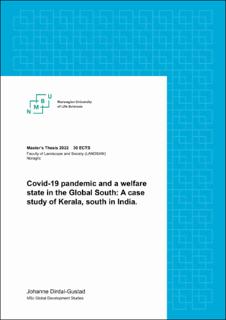| dc.description.abstract | This theses presents a theoretical analysis on how the Indian state Kerala have managed the Covid-19 pandemic. Kerala is known for its unique development model characterized by a relatively high level of social development at low levels of economic growth. By investing in education, public health, land reforms, setting up social welfare programs and institutionalizing workers’ rights, Kerala has grown as a welfare state. When the Covid-19 pandemic started in 2020, Kerala was the first state in India with a case of infection. Experiences from previous crises of Nipah and the severe floods in Kerala, together with the Ebola outbreak in different parts of Africa, gave Kerala a framework in how to manage a new crisis. Even though the infection rate was rising, Kerala managed to be one of the states in India with the lowest fatality rate. This thesis addresses how Kerala managed the Covid-19 pandemic and how being a welfare state affected the management and further the socio- economic aspects. The theoretical framework of welfare and welfare state will provide insights of how a welfare state works, and different aspects of it. Being a welfare state seems to provide a better framework in the management of crises. In the analysis and discussion chapter both India and Kerala are analysed as a welfare state, before further analysis and discussion about the crisis management of Kerala was handled in the Covid-19 pandemic. The pandemic has given both short-term and long-term effects in sickness and death count. In addition, the pandemic has affected the socio-economic in a way that could give repercussions both now and in the future. Furthermore, the thesis will look at how previous crisis management could be applied faced with new challenges and how they can use these experiences when faced with future crises. | en_US |

